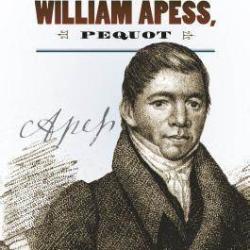If you want to get historians angry, accuse them of neglecting “the public.” That’s what happened last week when conservative Washington Post columnist Max Boot placed at least some of the blame for the seeming historical illiteracy of the American public on historians themselves:
As historians Hal Brands and Francis Gavin argue in War on the Rocks, since the 1960s, history professors have retreated from public debate into their own esoteric pursuits…. Historians need to speak to a larger public that will never pick up their academic journals — and students need to grasp the importance of studying history, not only for their own future but for the country’s, too.
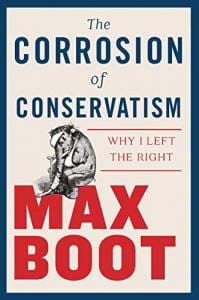 I’m certainly not going to quibble with Boot’s challenge to students, though I wish that a column that opened with declining numbers of history majors would pay some attention to the ways that colleges and universities (and their corporate and political partners) are themselves contributing to that trend. And I’m not going to linger on his argument that there’s been an overcorrection to older emphases on military and diplomatic history. Like Boot, I studied those fields at Yale under Paul Kennedy. Unlike him, I find social and cultural history anything but “esoteric” or irrelevant to students.
I’m certainly not going to quibble with Boot’s challenge to students, though I wish that a column that opened with declining numbers of history majors would pay some attention to the ways that colleges and universities (and their corporate and political partners) are themselves contributing to that trend. And I’m not going to linger on his argument that there’s been an overcorrection to older emphases on military and diplomatic history. Like Boot, I studied those fields at Yale under Paul Kennedy. Unlike him, I find social and cultural history anything but “esoteric” or irrelevant to students.
Mostly, I keep coming back to his notion that historians are disengaged from the larger public. If I’d read Boot’s column twenty years go, when I was in graduate school, or even ten years ago, when I was employed but still charting my own path as a scholar, I might have agreed. It’s taken me that long to unlearn many pathological assumptions elevating academic above “popular” history, and research over teaching (still the most important way that most of us engage with a non-specialist public). I certainly didn’t know many models of public scholarship in my guild.
But here in 2019, he’s just wrong. As Boot’s Twitter mentions soon made clear, historians of all fields and housed in all types of academic institutions are engaging with all manner of publics via all sorts of media. You’re currently reading one example of the phenomenon: a group blog by which Christian historians reach tens of thousands of readers each month. My own blog started a year before The Anxious Bench; sometime in the next couple months, I’ll publish my 2,000th post at The Pietist Schoolman. Last year I spent a quarter of my Sundays preaching and/or teaching in churches, and this morning I’m having coffee with a group of Lutherans who have been reading my most recent book, which consciously sought to draw on history for a general audience. I’m also in the middle of organizing another book project that bridges the church/academy divide.
If I’m more active on these fronts than some history professors, it’s because I’ve got supportive co-workers and family who value what I do and help me find the time to do it. But in my experience, it’s becoming less the exception than the rule for historians to discuss the past in public — through books, blogs, and speaking gigs, but also Twitter threads, digital projects, and op-eds in papers like, well, the Washington Post.
If anything, the problem isn’t that too few historians are engaging with the public. The problem is helping a public overwhelmed with media choices find their way to the historians.
To that end, I thought I’d use the rest of this post to recommend five examples of another medium that many historians use to engage with the public: the podcast.

Actually, I’d been making podcasts for five years before I ever started blogging, and I’ve returned more and more to that medium in the last year or so. I’ll even be so bold as to mention my most recent effort before I’m done, but let me start by recommending four podcasts by other scholars. I don’t listen to every episode of each, but I’m familiar with all four and spent some time last week catching up on some of their recent work:
Past Present Podcast
Hosts: Nicole Hemmer, Natalia Mehlman Petrzela, Neil Young
Total Episodes: 168
Typical Length: 45-50 minutes
Sample recent episode: “Blackface, Venezuela, and Conversation Hearts”
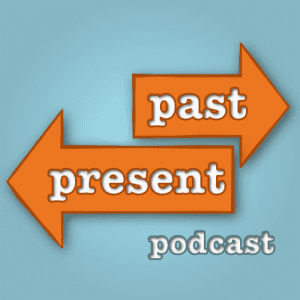 Given my love for Hamilton, I’m tempted to start by puffing BackStory, an American history podcast that features Hamilton scholar Joanne Freeman and has even had that musical’s original George Washington (Chris Jackson) as a special guest for an episode on public history. But instead, I’ll start by throwing some love to a series featuring somewhat lesser-known names. (Young may be a bit more familiar to our readers, as he used to write a religion column for The Huffington Post and has published a book on the history of the religious right.) Defying the stereotype of historians as stuffy academics who can’t speak but in jargon, the hosts of Past Present banter, joke, and kid each other. It’s one of my favorite approaches to podcasting: letting us listen in on a conversation among friends.
Given my love for Hamilton, I’m tempted to start by puffing BackStory, an American history podcast that features Hamilton scholar Joanne Freeman and has even had that musical’s original George Washington (Chris Jackson) as a special guest for an episode on public history. But instead, I’ll start by throwing some love to a series featuring somewhat lesser-known names. (Young may be a bit more familiar to our readers, as he used to write a religion column for The Huffington Post and has published a book on the history of the religious right.) Defying the stereotype of historians as stuffy academics who can’t speak but in jargon, the hosts of Past Present banter, joke, and kid each other. It’s one of my favorite approaches to podcasting: letting us listen in on a conversation among friends.
Still, the topics are as serious as racism and drug trafficking, and even ostensibly light segments point out surprising connections between past and present. A discussion of the history of Valentine hearts, for example, touched on regionalism, empire, and childhood… and also revealed Young’s preference for waxy, chalky, and gummy candies over chocolate. (He’s wrong about that, but right about Brach’s being better than Necco.)
Now, if a podcast that inveighs against the intertwining of American power with capitalism and foreign dictatorship sounds like it perches on one wing of the political spectrum, know that Past Present is at once challenging, funny, and nuanced. The Valentine’s episode also found the hosts complicating the recent history of Venezuela, suggesting that progressives might be too prone to misinterpret the failure of a socialist state by forcing analogies to the Reagan Era of the Cold War. Indeed, Past Present describes itself as “an alternative to the reflexive and polarized world of punditry. Interested in the world around you but exhausted by rote reactions and partisan talking points? You’ve come to the right place.”
Ben Franklin’s World
Host: Liz Covart
Total Episodes: 226
Typical Length: 50-65 minutes
Sample Recent Episode: “Elaine Forman Crane, The Poison Plot: Adultery & Murder in Colonial Newport”
The motto of Past Present is “Where hindsight becomes foresight,” and this desire to connect the past and present is a recurring theme with many history podcasts. For example, Liz Covart’s popular series on early American history starts with this claim: “The study of history is key to understanding who we are and how we can affect a better future. Ben Franklin’s World will introduce you to historical people and events that have impacted and shaped our present-day world.”
But even more than Past Present, Covart’s show pulls back the curtain from the scholarly work of history, with certain episodes solely devoted to aspects of “Doing History.” (BFW is produced by the Omohundro Institute of Early American History and Culture.) In my sample episode, historian Elaine Forman Crane explained how she told the story of Mary Arnold and her husband Benedict (no, not that one). In the process, listeners better understood what historians do — and what they can’t do. Even as Crane emphasized the unknowability of early American women who weren’t able to leave behind extensive sources, she showed how historians can recover the past down to the level of microhistory (“A small story,” she called the Arnolds’ divorce, “with large implications.”)
Covart is an especially engaging host who makes a point of getting to know listeners online, through comments on the excellent show pages and via a busy Twitter feed, and in real life. The podcast’s occasional “meet-ups,” she told us newer listeners, are “where I get the chance to really talk with you,” getting feedback and testing new ideas.
The Way of Improvement Leads Home
Hosts: John Fea, Drew Dyrli Hermeling
Total Episodes: 46
Typical Length: 50-65 minutes
Sample Recent Episode: “A City Upon a Hill”
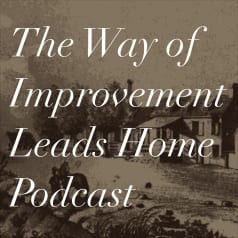 Speaking of engaging hosts… This one is already well known to many readers of this blog, where he used to be a contributor. In many ways, John is the epitome of the 21st century historian: equally at home writing serious scholarly monographs and engaging with any and all comers through digital media.
Speaking of engaging hosts… This one is already well known to many readers of this blog, where he used to be a contributor. In many ways, John is the epitome of the 21st century historian: equally at home writing serious scholarly monographs and engaging with any and all comers through digital media.
As he does with a recurring “Author’s Corner” series at his venerable blog, John often uses his podcast to share the work of fellow historians. In this episode, he featured Daniel T. Rodgers, author of a new book on one of the most famous sermons in American history. (Agnes blogged about it at Anxious Bench last November.) John, producer Drew Hermeling, and their guests delve into many aspects of religion, politics, and U.S. history, but TWOILH can range widely, as in the Season 4 episode on the history of the “Memphis sound.”
Perhaps the recurring question of TWOILH is whether the past is “usable.” In the “City Upon a Hill” episode, John added a commentary inspired by the Greenwich Tea Burning of 1774, which he notes has been used to promote everything from the assimilation of immigrants to Cold War anti-Communism to the 21st century version of the Tea Party. (Learn more from John’s 2017 post on the topic for Omohundro, plus an accompanying episode of Ben Franklin’s World.) “The past should always be useful,” John agrees. But he warns that the past may not be usable as we’d like it to be:
…sometimes the past is not easily consumable. Sometimes what happened in previous eras has no direct relevance for our lives today… Sometimes the past introduces us to people whose ideas and behavior we want to forget, rather than resurrect for some modern-day agenda… In the end, good historical thinking requires us to see the past in all its fullness, whether it fits our pet causes or not…. This is why historical thinking is central to our role as citizens in a democracy.
The Christian Humanist Podcast
Hosts: Nathan Gilmour, Michial Farmer, David Grubbs
Total Episodes: 259 (not counting related podcasts on the Christian Humanist Network, some of which are also of interest for history buffs)
Typical Length: 60-70 minutes
Sample recent episode: “The Bullet or the Ballot”
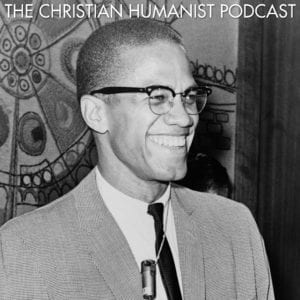 On first glance, it may seem odd to include on this list a podcast hosted not by historians, but Christian college professors who are devoted to studying “Theology, philosophy, literature, art, and other things that human beings do well.” But the CHP helps us study the past as part of the larger project of the humanities.
On first glance, it may seem odd to include on this list a podcast hosted not by historians, but Christian college professors who are devoted to studying “Theology, philosophy, literature, art, and other things that human beings do well.” But the CHP helps us study the past as part of the larger project of the humanities.
Whether they’re talking about the 1964 Malcolm X speech at the center of my sample episode, Henry Wadsworth Longfellow’s Civil War poem-turned-Christmas carol “Christmas Bells,” or the medieval play “Everyman,” the three hosts help listeners understand the philosophical, theological, literary, or rhetorical significance of a particular text. But they also use the text to illuminate historical context. In discussing “The Bullet or the Ballot,” for example, the CHP guys reach back to an earlier debate between W.E.B. DuBois and Marcus Garvey and connect forward in time to the liberation theology of James Cone. In the process, they stay true to their founding commitment to take “the question at hand seriously and ourselves not at all.”
By the way, Cone was also the subject of a recent episode of Christian Humanist Profiles, just one of many spinoffs from the original CHP. Other podcasts on the network cover politics, feminism, Disney movies, and… well, whatever my own Pietist Schoolman Podcast happens to be about during a given season.
The 252
Hosts: Chris Moore, Sam Mulberry, Chris Gehrz
Total Episodes: 4
Typical Length: 40-50 minutes
Sample Recent Episode: “The Mount Rushmore of Baseball History”
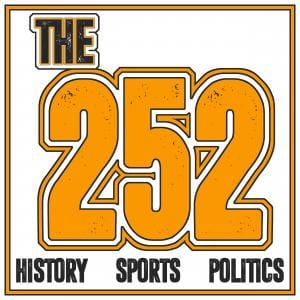 And now that I’ve already engaged in a bit of self-promotion, let me be even more self-aggrandizing with my final recommendation, a brand new podcast that serves as a prequel to HIS/POS252L History and Politics of Sports, a new gen ed option I’ll be teaching next year.
And now that I’ve already engaged in a bit of self-promotion, let me be even more self-aggrandizing with my final recommendation, a brand new podcast that serves as a prequel to HIS/POS252L History and Politics of Sports, a new gen ed option I’ll be teaching next year.
I’ve taken to introducing each episode of The 252 as “sports talk radio as done by academics,” and there are echoes of that genre in our use of games, musical bumpers, and interviews with guests (in studio and by phone). But knowing that more than a few of our peers instinctively sneer at “sportsball,” we’re committed to taking seriously the study of sports: on their own terms, and as a way of helping listeners (and eventually our students) ask fundamental questions about faith, politics, society, culture, and the economy. On last week’s episode, for example, we started with quick riffs on the business of football — and the ethical problems inherent in watching so violent a game — then turned to our main focus: how the history of my favorite sport holds up a mirror to trends in American history… and reveals our propensity to remember the past through the haze of nostalgia. On upcoming episodes we’ll delve into the history of amateurism, the significance of Title IX, and cinematic visions of sports.
None of us are actual experts in the study of sports, so we’re also committed to introducing our audience to scholars like Paul Putz, who will join us next month to talk about the fusion of Christianity and sports, and Art Remillard, who explained how sports themselves are religious. And we’ll talk to local experts like Bethel journalism professor Scott Winter, who this week will help us understand the changing role of sports media.
“What about an Anxious Bench podcast?”, someone just asked. I can’t say I’ve raised the idea with the rest of our roster, but if we get enough interest from readers… who knows what the future may bring?








